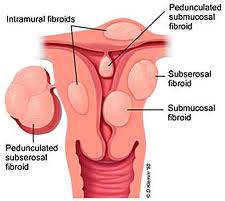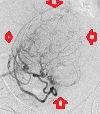What are fibroids?
Fibroids are benign tumors of the uterus that have near-zero risk of becoming cancerous. The uterus could have one or several fibroids located in any of its different layers. Like the uterus, the growth of fibroids is influenced by circulating female hormones. For this reason,

fibroids and the problems they cause are com- mon in women of child-bearing age. At meno- pause, they die and rarely cause problems.
How do I know that I have uterine fi-broids?
Many women with uterine fibroids do not know they have them, because they do not border them. These women do not need any treatment. Some women may have symptoms caused by fibroids, but believe they are natural menstrual phenomena. These symptoms include heavy and painful periods, unpredictable erratic menses, lower back pain, constipation, painful sex, frequent urination, increased abdominal girth, and reduced ability to conceive or keep pregnancy. The frequent, heavy menstruation may lead to anemia resulting in persistent tiredness, poor exercise tolerance, and air hunger after common exertions. Women with these problems often consult a physician.
Are symptomatic uterine fibroids treatable?
Yes, symptomatic uterine fibroids are treatable. If menopause is near and a woman’s symptoms not major, she may choose to wait for them to resolve at menopause. Options available to women with major complaints include hormonal treatment, myomectomy, endometrial ablation, hysterectomy, and uterine fibroid embolization.
What is uterine fibroid embolization (UFE)?

Fibroids before UFE
Stated simply, UFE is the injection of biocompati- ble particles into the arteries supplying the uterus to obstruct the flow of blood to it. A small catheter the size of spaghetti is inserted into an artery in the groin or the left arm and advanced into the uterine arteries. Particles of variable sizes are injected into the arteries to block them and kill the fibroids, not the uterus.
The advantages of UFE include:
- It is safe and effective.
- It requires no general anesthesia and can be quick.
- It requires short or no hospitalization.
- It stops or decreases heavy menstrual bleeding and cramping in most patients.
- It decreases the uterine volume.
- It permits early return to work and usual lifestyle.

Fibroids during UFE

Fibroids 12 months after UFE



